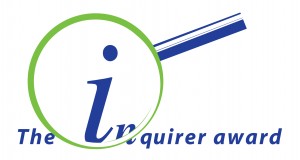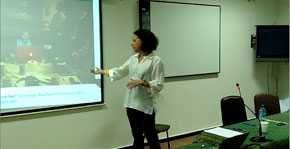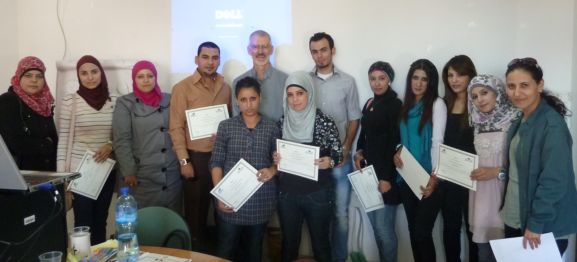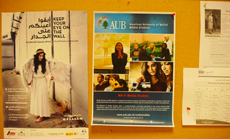 Since 2003 the Thompson Foundation honors Arab investigative reporters – in print, television and photojournalism – with the Inquirer Award. Journalists from Palestine as well as in Jordan, Syria, Lebanon and Iraq are eligible to compete for the award.
Since 2003 the Thompson Foundation honors Arab investigative reporters – in print, television and photojournalism – with the Inquirer Award. Journalists from Palestine as well as in Jordan, Syria, Lebanon and Iraq are eligible to compete for the award.
To be considered for the award, fill out the entry form on the Thompson Foundation’s web site. This also hold the rules for each category. Entry forms are available in both English and Arabic, but the original entry piece must be primarily in Arabic.
Deadline for entries are December 1, 2011.
Good luck!
For more information see:
Thompson Foundation - Inquirer Award 2011
NEWS
Are you the investigative reporter of the year?
Social media and the occupation

Under the title 'Social media and the Occupation' Palestinian and international speakers discussed the use of social media by Israeli authorities as well as Palestinian activists. The event was hosted by the MDC and PARC (Palestinian and American Research Center)and among the speakers was the American professor at Duke University, Rebecca Stein.
Dr. Stein explained that social media is often being given a lot of credit as a tool for ‘digital diplomacy’ for democratic grassroots activists, but according to Stein this is ‘digital utopia’:
“What is forgotten is that these technologies are also available to authorities and repressive state forms, and they can be mobilized from the top just as easily as they can be mobilized from the bottom,” Stein said.
Currently researching the use of social media by Israeli authorities as a political tool in the context of the military occupation, Dr. Stein presented some of her main results from her research, concluding that though the Israeli authorities are using social media more and more, the majority of the social media strategies have been improvisational.
“I think the state is really trying to remake its image having this social media in mind, but I think the effects have yet to be seen,” Stein said. Critical views on social media
Critical views on social media
In spite of it being the day before the holidays the event attracted close to 40 people including local and international journalists, media and communication professionals as well as students and others intrigued by the headline of the event.
All speakers presented critical angles to the celebration of social media as a means for democratic activism and represented a broad variety of backgrounds as noted by one of the speakers, the Jordan-based Ramsey George.
“This is an interesting lineup for a talk on this topic - we have a professor, someone who kind of sits in the middle and the true media activist,” he said.
Drawing on his own observations in regard to the use of social media in the Arab uprisings, George noted that revolutions have happened before through other means, but that social media tools just grant new ways to communicate effectively.
“Unions in Egypt have been organizing for 50 years. The popular committees in Palestine has existed for a long time. Social media tool have just helped push their messages into the mainstream media,” George concluded.
Agreeing with this, the coordinator of the Research and Policy Unit, Abdelrahim Abdallah noted:
“The dominant narrative about the Arab Spring has been that social media moved the masses and brought democracy to the Middle East. I question that. Social media was a minor not a major cause or even a tool."
Social media to overcome boundaries set by the occupation
In spite of the speakers’ critical perspectives on the view of social media as a catalyst of democracy and revolutions, student and activist Nejla Keyed talked about how social media can actually work as a tool to overcome the obstacles Palestinians face by the occupation.
“Instead of just watching the mainstream news and get high blood pressure from frustration we now have the possibility to talk to the IDF spokesman (through twitter, ed.). We can also reach people from the USA, from Europe and everywhere. And we can reach other Palestinian people. And because we have checkpoints that prevents us from meeting on ground, it’s important for us to use social media,” Kayed said and explained that using social media grants credibility because the information comes from people on the ground rather than governments.
After the talks, the speakers engaged in debates with the audience who eagerly discussed states’ and authorities’ use of social media.
Read all of Abdelrahim Abdallah’s talk on the MDC blog
Read more about Rebecca Stein and her research
27 New Conflict Sensitive Journalists

The Media Development Center recently finished a comprehensive course in conflict sensitive journalism in Gaza and the West Bank conducted by the Canadian journalists John Keating. Keating has trained journalists all over the world but found the training particular complicated in the occupied Palestinian territories.
“The biggest difference is definitely that it’s an occupation,” said Keating and explained that the conflict has become so deeply rooted in that journalists no longer see how it is affecting their journalism.
“My main impression is that journalists here have not really done a lot of thinking about their role as journalists as opposed to their role as Palestinian citizens,” but at the end of the courses Keating felt very encouraged, that the trainees were now thinking about it and understanding it and would incorporate some of it as much as they could.
The course was carried out from and was funded by UNESCO. According to Hala Tannous from UNESCO such courses are very important to give Palestinian journalists the necessary skills to work in a complex and sensitive environment such as Palestine.
“Part of the course was designed to explain how conflicts work and how they are settled, we hope that such techniques would help our Palestinian journalists to explore more ways of tackling the ongoing local situation, and to understand the mechanics which combines their experience with the new ideas presented,” she said.
The course consisted of a three day workshop (October 18 to 20) with 13 journalism students and fresh graduates in the West Bank and a five day work shop (October 22 to 25) in Gaza with 14 trainees, mainly experienced journalists. These courses were the first of its kind carried out by the Center, but according to Keating it would be beneficial to conduct more similar trainings – also in Israel.
“I would like to more of it done here and I would like to see it done on the Israeli side as well because they have a lot of responsibility in treating the news fairly. It might be an opportunity to expand the field a little bit and get people to do more work here,” he said.
Keating has more of 30 years of experience as a journalist in Canada and has conducted similar courses around the world including Kenya and Nepal.
Read more about the course on the MDC blog
EVENT: Social Media and the Occupation
The Media Development Center (MDC) at Birzeit University and the Palestinian and American Research Center (PARC) invite you to the seminar:
‘Social Media and the Occupation’
November 3rd, 2011 – 12.00-15.00
Birzeit University, Women’s Studies Institute, room 101
Social media has become an integrated part of the everyday life, not least in the Arab world. Throughout the year, the Arab uprising have showed us how social media can be used for advocacy, mobilization and activism – but social media can also be used by the authorities to monitor and block attempts of protests. Please join us for a seminar and discussion on the role of social media in occupied Palestine.
The MDC and PARC are honored to host DUKE professor Rebecca Stein to speak about her current studies on the ways the Israeli state, government and military, uses social media as a political tool in the context of the military occupation:
Additional speakers are:
- Abdelrahim Abdallah (lecturer and coordinator at MDC): The Use of Social Media in Israel and Palestine
- Ramsey George (cofounder of the Jordan-based 7iber.com): Social Media Revolt – the role of social media in the Arab uprising
- Najlaa Kayed (young student, blogger and ‘tweep’): Social Media for Advocacy - through the eyes of a young Palestinian
We hope to see you for an interesting talk and discussion

More Articles...
Page 15 of 16






